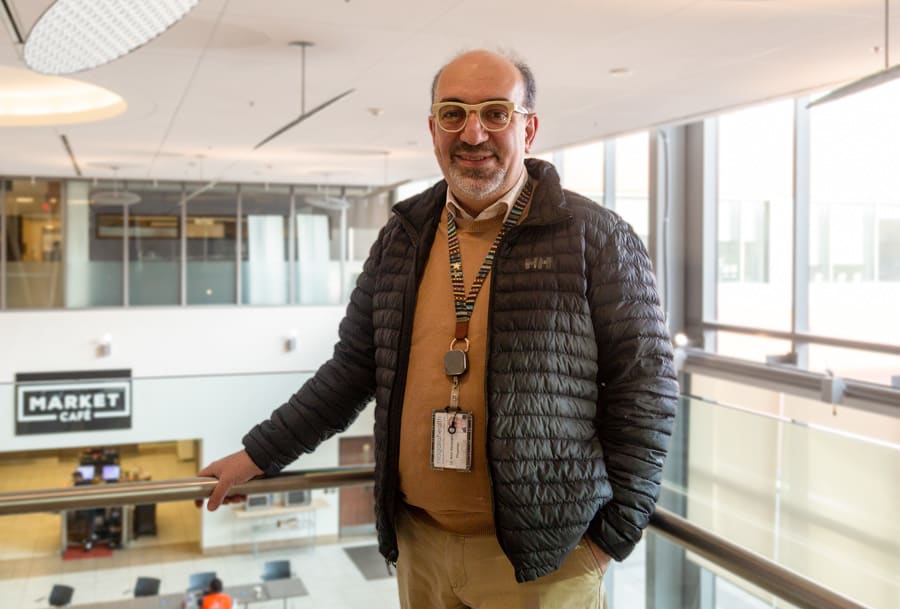We are Niagara Health is a series of stories that celebrates the incredible people working and volunteering in our organization and how they make a difference in the lives of patients and coworkers every day.

Anesthesiologist Dr. Amir Abrishami was recently recognized with a McMaster University Michael G. DeGroote School of Medicine – Niagara Regional Campus (NRC) George Bibawi Award for Excellence in Teaching.
Dr. Amir Abrishami steps into an operating room knowing his work as an anesthesiologist is a solitary art.
There’s no team of fellow anesthesiologists by his side; no collaboration that happens before setting to work sedating a patient. The focused precision his role demands leaves little room for conversation with the surgical team. Even the small talk he might share with a patient fades quickly as Dr. Abrishami’s handiwork as a guardian of their unconscious state takes effect.
Anesthesia is lonely work and you have to be very vigilant,” Dr. Abrishami says. “It’s like being in a spaceship. You have to look at the radar all the time to know what’s happening and at some point, you’re the only one who knows what’s happening.”
It was the collaborative efforts of a team, though, that brought Dr. Abrishami recognition for his contributions to anesthesia education last month when he received the McMaster University Michael G. DeGroote School of Medicine – Niagara Regional Campus (NRC) George Bibawi Award for Excellence in Teaching.
Created to honour the significant contributions to anesthesia teaching at NRC by retired Niagara Health anesthesiologist Dr. George Bibawi, the award is based on nominations from peers. It’s presented annually to a clinical anesthesia teacher who demonstrates excellence in teaching and a commitment to the development of the DeGroote School’s Department of Anesthesia in Niagara.
“Places like this are perfect for me. I can do clinical work and patient care but I can do research as well."
A natural aptitude for teambuilding
“Your consistent contributions to clinical teaching, in addition to your work supervising medical students in research projects, shows your dedication to the next generation of physicians,” Dr. Abrishami’s award letter reads. “Your colleagues appreciate your mentorship and your co-ordination of the department’s Continuing Medical Education (CME) program. Your teaching scores are strong and your willingness to teach clinically over many years has ensured that students and residents have continued to have excellent learning opportunities clinically and in scholarly activity.”
Anesthesiologist Dr. Maria Gonzalez was also nominated for the award for her enthusiasm teaching and supporting learners, and her professionalism and congeniality in the operating room.
“It’s a great achievement,” Dr. Abrishami says about the honours. “It really makes you feel like the work you do is recognized by your department, colleagues and students.”
For all the solo work demanded of him in the operating room, Dr. Abrishami has a natural aptitude for teambuilding and strengthening camaraderie among his peers.
Even during the loneliest days of the pandemic, he invited speakers, including his own mentor, Dr. Frances Chung from Toronto Western Hospital, to share their expertise with the Niagara Health anesthesiology team. Dr. Abrishami has also facilitated the rare opportunity for his fellow anesthesiologists to observe each other’s techniques, refine best practices and provide feedback based on checklist aligned to College of Physicians and Surgeons of Ontario requirements.
“You can work for 10 years without knowing how your colleagues do things,” he says. “I felt very rewarded in that role as CME. The award tells me my colleagues appreciated my work as CME as well."
Teaching the next generation of anesthetists
Dr. Abrishami’s professional support extends to medical learners, too. He happily mentors the next generation of anesthesiologists by supervising them in the operating room during their rotations or electives, and hosting workshops about case management and clinical skill integration.
As an assistant professor of anesthesia at McMaster, he also encourages their academic and research pursuits. In that role, he helped some of his students usher their work through to publication in the Canadian Journal of Anesthesiology. Last year, his collaboration with a student – now a resident in McMaster's School of Medicine – was showcased in a poster presentation at the International Anesthesia Research Society annual meeting.
Doing research keeps him current in his clinical practice, he says, and it helps his students think critically and apply their knowledge to delivering high-quality patient care.
It was also a driving force on his own career path to becoming an anesthesiologist. Dr. Abrishami practised family medicine in his native Iran before coming to Canada. After immigrating, he joined Dr. Chung’s high-profile anesthesiology research program at Toronto Western. Together, they co-authored 14 papers and Dr. Chung encouraged him to specialize in practising anesthesiology.
Doing so would allow him to pursue two passions: providing hands-on medical care while still doing research. After finishing his anesthesiology residency at the University of Toronto in 2015, Dr. Abrishami found Niagara Health, with its strong ties to the DeGroote School of Medicine, to be the ideal place for both.
“Places like this are perfect for me. I can do clinical work and patient care but I can do research as well,” he says. “It’s my passion. Research helped me get into the system. I feel obligated to do research. It makes me feel active, and not just in my day-to-day practice. I like the critical thinking and coming up with new ideas.”
Now, with the Bibawi Award in hand, he reflects on the belief Dr. Chung had in him, and feels a mix of pride and gratitude.
“I feel like I’m getting close to where my role model is. It makes me feel good to have that kind of character,” Dr. Abrishami says. “It feels good to be recognized by my colleagues. It feels good that both students and academics appreciate you. It makes me feel like I’m making a difference in my work, not just in patient care but in education and research.”

